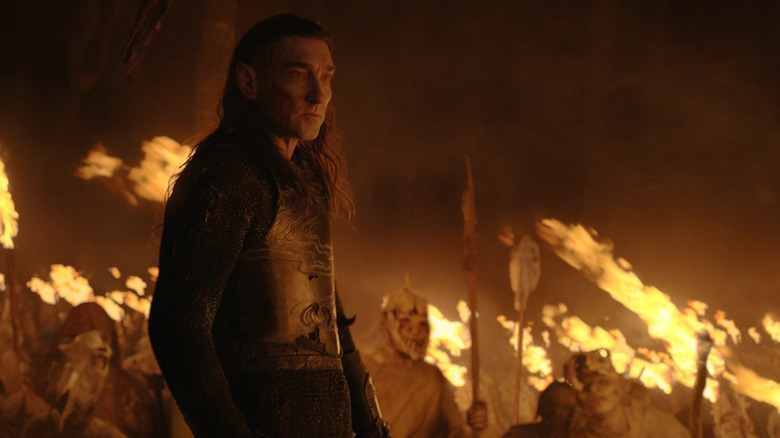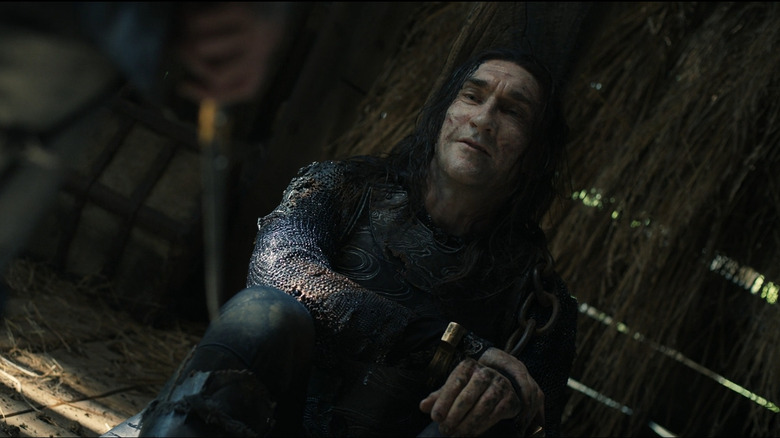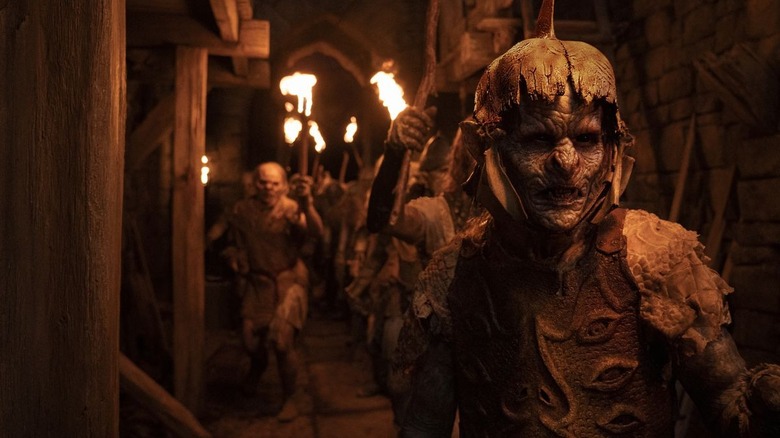The Rings Of Power Revealed The Origins Of The Orcs That J.R.R. Tolkien Was Never Clear About
Spoilers follow for the sixth episode of "The Lord of the Rings: The Rings of Power."
"The Lord of the Rings: The Rings of Power" aligns itself tightly with the heart of J. R. R. Tolkien's work, but the latest episode gave clarity to one of the biggest mysteries that has plagued the canon since its inception. Orcs have been around in fantasy lore for what seems like forever, yet "The Lord of the Rings" never settled on a definitive origin for the race. Tolkien has written about them at length in his works, but he often contradicted himself when it came to who the orcs originated from. "The Rings of Power" answers this long-standing question by choosing the origin put forth in Tolkien's "The Silmarillion."
After a major cliffhanger, Adar and his orc army (Joseph Mawle) made their way through the Southlands in the sixth episode with a very sinister purpose. But having been bested in the battle against the citizens of the village and Númenor, Adar was imprisoned (temporarily) and questioned by Galadriel (Morfydd Clark). It's here when we finally understand the true nature of Adar and his fellow "Uruk."
One big family of corrupted elves
As it turns out, the orcs call Adar "father" for a reason. Adar confirms Galadriel's assumption that he is one of the first elves tortured and twisted by Morgoth to form the orc race. He expands, revealing they prefer the term uruk. Once Sauron took Morgoth's place, Adar says the Dark Lord "sought to craft a power not of the flesh, but over flesh, the power of the unseen world." Adar and the other orcs grew tired of Sauron's endless search and torturous methods, so the part-elf leader killed the Dark Lord. That last part is probably wishful thinking, however.
This origin is taken straight from "The Silmarillion," on which most of the series is based. The text suggests that orcs are descendants of East Elves that were corrupted, twisted, and then bred by Melkor, aka Morgoth. This is the most widely accepted explanation, but Tolkien also teased other possible origins that murk up the canon. In one instance, according to "Morgoth's Ring," Tolkien also theorized that orcs could have derived from corrupted humans. He also implies some orc leaders may have been fallen Maiar, and others were a cross-breed of humans and elves.
Tolkien never confidently settled on a definitive version of the story, but why is that? The answer is complicated, to say the least.
Why their origins changed so often
The creation of the orc race as cannon fodder for "The Lord of the Rings" presents a moral conundrum. Dubbing an entire race as evil and beast-like comes across naturally throughout the novels, with Tolkien going as far as to constantly imply they act and "breed" like soulless animals. Giving them an origin complicates this simplistic understanding of orcs, but that did not stop Tolkien from trying. Whether they were originally elves or humans, he sought to justify their existence without contradicting the basic fact they were inherently evil. But none seemed to have pleased Tolkien, and he never got to settle the debate before his passing.
"The Rings of Power" opts to maintain the original intention behind the orcs while giving them multi-faceted dimensions. There are still portrayed as deviants, but they have a reason for their behavior. Moreover, the series positions Galadriel in a morally complex situation, as she finds herself battling darkness amidst the genocidal remarks she makes to Adar in the episode. Once Sauron returns, perhaps the answer to that philosophical question will be revealed.


